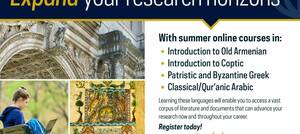Notre Dame Summer Languages: Classical, Medieval and Near Eastern Institute
Notre Dame's summer language courses are for motivated undergraduates and graduate students. Our courses give students the opportunity to study the ancient languages necessary to understanding Greek and Roman, Judaic, Early Christian, Medieval and Byzantine civilizations. Students may study a language while taking additional courses in history or theology.
Our campus is comfortable and serene during the summer. On-campus housing and food service are convenient, readily available, and comparatively inexpensive. In addition, Notre Dame’s Library has special strengths in Biblical Studies, Early Christian Literature, Medieval Studies, and Byzantine Studies.
See the full list of course times and offerings.

STUDY CLASSICS IN ROME: "ROMANS AND CHRISTIANS"
Instructor: Professor Hildegund Müller
3 credits; July 1-20, 2024
Ancient Christianity developed and spread from within the borders of the Roman World. As a result of its emergence, everything in the Roman world changed: thoughts, beliefs, norms, aesthetic preferences and social norms. But how exactly did that shift happen? How was Christianity itself shaped by that interaction? In this program, we will tour landmark Roman and Christian monuments (e.g. the Roman Forum, the Colosseum, San Clemente and the Vatican), and, through these monuments, we will explore the social, cultural and political preconditions and consequences of Christianization. (This course is taught in Rome, Italy)
https://studyabroad.nd.edu/programs/rome-summer-classics/
Latin
BEGINNING LATIN I
CLLA 10001/60001 01
Instructor: tbd
MTWRF 1:00-3:45
BEGINNING LATIN II
CLLA 10002/60002 01
Instructor: tbd
MTWRF 9:00-12:00
This two-semester sequence of courses introduces students to the language of the ancient Romans for the first time. It emphasizes the fundamentals of Latin grammar and vocabulary, and prepares students to read original Latin texts. An appreciation for ancient Roman culture is also fostered through secondary readings and class discussion.
INTERMEDIATE LATIN
CLLA 20103/60103 01
Instructor: tbd
MTWR 9:00 - 11:40 am
This course builds on the work of Beginning Latin I and II. It combines a review of grammar with careful reading of classical Latin authors such as Cornelius Nepos and Ovid. The course improves students' translating skills, introduces methods for studying Latin literature in its historical and cultural contexts, and prepares students for more advanced work in the sophisticated literature of the ancient Romans.
Ancient Greek
Beginning Greek I
CLGR 10001/60001 01
Instructor: Professor Christopher Baron
MTWRF 9:00-12:00
Beginning Greek II
CLGR 10002/60002 01
Instructor: Professor Christopher Baron
MTWRF 9:00-12:00
This two-semester sequence of courses introduces students to the language of the ancient Greeks for the first time. It emphasizes the fundamentals of ancient Greek grammar and vocabulary, and prepares students to read original Greek texts. An appreciation for ancient Greek culture is also fostered through secondary readings and class discussion.
Intermediate Greek
CLGR 20103/60103
Instructor: tbd
MTWR 2:00-4:30 pm
This second-year language course is designed for students who have taken one year of Beginning Greek or its equivalent. The course combines a review of grammar with careful reading of classical Greek authors including Lysias, Plato, and Homer. In addition to improving students' translating skills, this course introduces methods for studying Greek literature in its historical and cultural contexts, and it prepares students for more advanced work with a variety of ancient Greek literary genres. At the course's end students will be functioning independent readers of Greek.
Other Languages
Classical/Qur'anic Arabic I
MEAR 40027/60027
Instructor: Catherine Bronson
MTWR 5:30pm - 6:40 pm (Fully Online)
The goal of this course is to continue to develop a basic knowledge of the Classical/Qur'anic Arabic, with an emphasis on an overview of grammar and syntax, vocabulary acquisition, and serial readings of Islamic texts. We will read selections from Qur'an, Qur'anic exegeses, hadith (Prophetic tradition), and other related material, such as Islamic legal texts. We will learn how to use Arabic/Islamic bibliographical references (in print and online). One year of Arabic recommended.